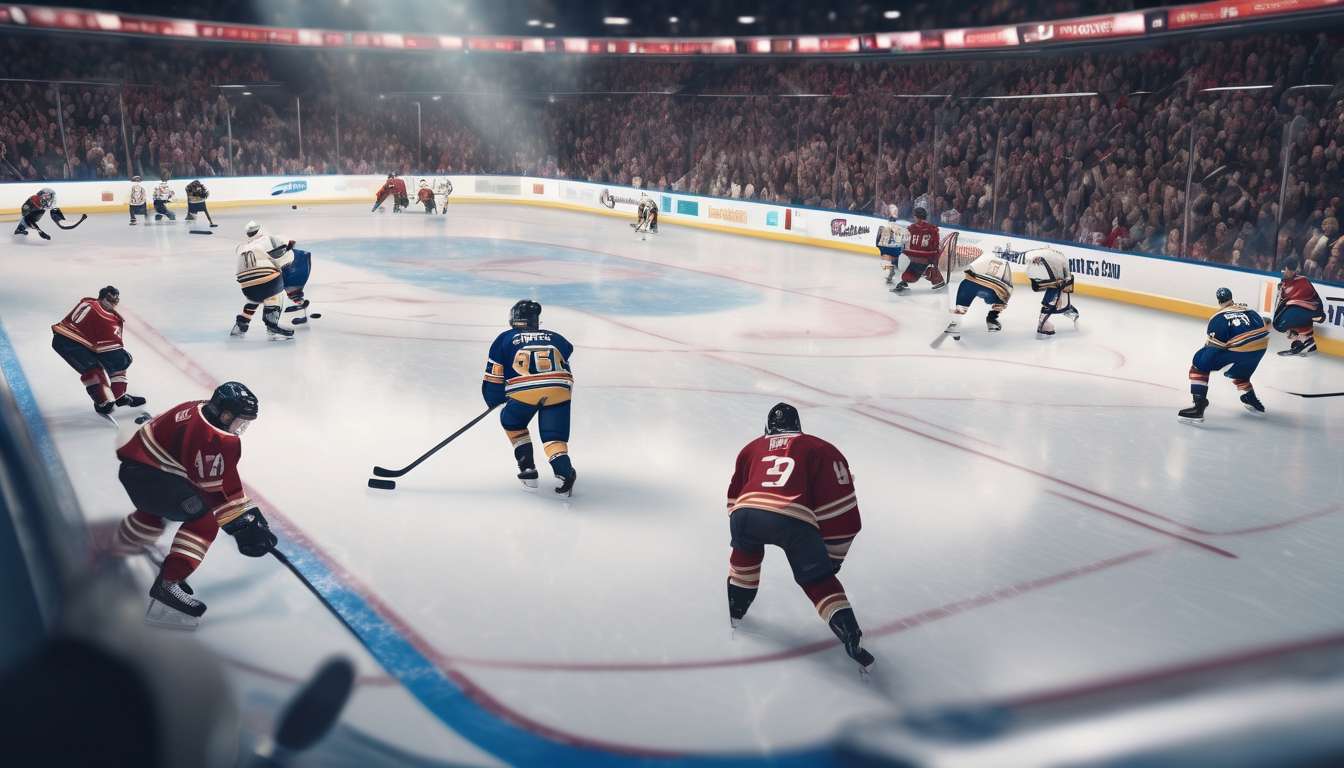In the fast-paced world of the NHL, every game has the potential to significantly impact a team’s season. As avid fans and analysts, we constantly seek expert insights to navigate the unpredictable tides of hockey. The thrill and complexity that come with making predictions about our beloved teams drive us to delve deeper into expert analysis.
Our goal is to uncover the strategies and factors that influence the outcomes of today’s games. This involves examining various elements such as:
- Player performance metrics
- Team dynamics
- Coaching strategies
By distilling the vast sea of data into actionable insights, we aim to understand how seasoned analysts make predictions. They blend statistical acumen with intuitive foresight, a skill we wish to explore and learn from.
Tapping into expert expertise enhances our understanding and appreciation of the game, transforming us into more informed and engaged spectators. We invite you to join us on this journey to unravel the secrets behind accurate NHL predictions.
Statistical Analysis Techniques
To predict NHL outcomes effectively, we rely on several statistical analysis techniques that help us interpret complex data. As a community of hockey enthusiasts, we share a common goal: to make accurate NHL predictions today. By pooling our knowledge, we enhance our understanding of the game’s intricacies.
Key Techniques Used:
-
Regression Analysis: Helps identify relationships between variables, such as player performance and game outcomes.
-
Machine Learning Algorithms: Identify patterns and trends in data, providing a clearer picture of team performance and player statistics.
These techniques allow us to break down complex data, creating a clearer picture of what to expect in upcoming games. Our sense of belonging is strengthened when we engage in these analyses together, sharing insights and refining our methods.
Predictive Modeling:
-
Combines historical data with current metrics to forecast outcomes.
-
Ensures we stay updated, fostering both accuracy and camaraderie.
By utilizing these techniques, we’re not just predicting games; we’re building connections through shared passions and expertise.
Key Performance Indicators
In our quest to make accurate NHL predictions, we rely on key performance indicators (KPIs) to pinpoint the factors that most significantly influence game outcomes. These KPIs are our guiding stars, helping us navigate the complex world of hockey analysis.
When we come together as a community of fans and analysts, understanding these metrics brings us closer, making us feel like part of something bigger.
We focus on KPIs such as:
- Player efficiency ratings
- Power-play success rates
- Goaltender save percentages
These statistics aren’t just numbers; they tell the story of a team’s strengths and weaknesses.
For our NHL predictions today, we evaluate:
- Teams’ recent performances
- Individual player contributions
By honing in on these KPIs, we gain insights into which teams have the momentum or face challenges.
Together, we share in the excitement of analyzing these performance indicators, ensuring that our predictions are informed and our conversations rich with insight.
Let’s embrace these tools and strengthen our community’s understanding.
Trend Identification Strategies
To identify trends in NHL performance, we analyze historical data and emerging patterns that reveal shifts in team dynamics and player effectiveness. By examining past games, player statistics, and team records, we uncover subtle changes that might signal a team’s rise or fall.
Key factors to monitor include:
- Injuries
- Trades
- Coaching changes
These factors can significantly impact today’s NHL outcomes.
When we spot a pattern, we don’t keep it to ourselves. We share our insights with fellow hockey enthusiasts who, like us, seek a deeper understanding of the game. This shared knowledge strengthens our community, making us all more informed fans.
It’s not just about making accurate NHL predictions today; it’s about connecting with others who share our passion.
We also embrace technology by using advanced tools to track and visualize trends. This approach allows us to stay ahead of the curve, ensuring our NHL predictions are grounded in solid evidence and collective wisdom.
Data-Driven Predictive Models
In our quest to enhance NHL predictions, we employ data-driven predictive models that leverage extensive statistical analysis and machine learning algorithms. By doing so, we’re not just guessing; we’re making informed decisions that unite our community of hockey enthusiasts who seek precise NHL predictions today.
Our models meticulously process vast amounts of data, from team performance metrics to individual player statistics, ensuring our predictions resonate with those who value accuracy.
Together, we delve into:
- Historical game data
- Current season trends
Crafting predictions that feel like a shared victory when they ring true.
We understand that the thrill of the game extends beyond the ice, and our community thrives when we collectively anticipate outcomes with confidence. By embracing these advanced methods, we’re not only enhancing our understanding but also strengthening our bond as fans committed to the sport.
As we continue to refine our techniques, we’re excited to be part of a group that celebrates informed and insightful NHL predictions today.
In-Depth Player Evaluation Methods
To enhance our predictions, we delve into in-depth player evaluation methods that incorporate advanced statistics and video analysis to accurately assess individual performance levels.
By examining metrics like:
- Corsi
- Fenwick
- Expected goals (xG)
we uncover the nuances of a player’s contributions on the ice. This statistical insight, combined with video breakdowns, allows us to see beyond basic stats like goals and assists, painting a fuller picture of each athlete’s impact.
In our community of passionate hockey enthusiasts, we know that feeling connected to the game enhances our experience. By using these sophisticated evaluation tools, we ensure our NHL predictions resonate with fans who crave a deeper understanding of player capabilities.
We don’t just look at the numbers; we watch how they translate into gameplay, identifying patterns and tendencies that inform our forecasts. Together, these insights create a comprehensive view, making our predictions not just informed, but truly insightful for everyone involved.
Tactical Game Plan Insights
Tactical Game Plan Insights
We dive into tactical game plan insights by analyzing team strategies and formations that can influence the outcome of NHL games. Our focus sharpens on how a team’s approach to both offensive and defensive plays impacts their performance.
Key Factors in NHL Predictions
For today’s NHL predictions, we can’t ignore the significance of:
- A well-timed power play
- A solid penalty kill
Teams that excel in these areas often have the upper hand, dictating the pace and momentum of the game.
Adaptability and Strategy
In the ever-evolving landscape of hockey, the ability to adapt is crucial. Coaches who skillfully adjust their strategies based on opponents’ weaknesses often lead their teams to victory. We notice trends like:
- Increased use of aggressive forechecking
- Flexible zone defenses
These tactics not only disrupt the opposition’s rhythm but also create scoring opportunities.
Community and Passion
By immersing ourselves in the nuances of these game plans, we strengthen our sense of community and shared passion. Let’s embrace these insights and refine our NHL predictions today.
Psychological Factors Consideration
In our analysis of NHL predictions, we can’t overlook how mental toughness and team cohesion significantly influence game outcomes.
When we gather to make NHL predictions today, we must consider the psychological resilience of teams. A squad that bounces back quickly from setbacks is often one that finds success on the ice. Mental fortitude isn’t just about individual players; it’s about how they support each other, creating a unified front against adversity.
Team cohesion is another critical psychological factor. When players form strong bonds, they:
- Communicate better
- Anticipate each other’s moves
- Foster a sense of belonging
This unity can be the difference between a win and a loss. We see it when teams rally from behind or maintain composure in high-pressure situations.
As we make NHL predictions today, let’s remember that the mental game is as crucial as physical skills. Understanding these psychological dynamics helps us connect with the heart of the sport and predict outcomes more accurately.
Expert Tips for Accurate Predictions
To boost our prediction accuracy, we should rely on a blend of statistical analysis, expert insights, and current team dynamics. As a community passionate about hockey, understanding the intricacies of NHL predictions today binds us together.
Statistics:
- Analyzing player performance data
- Reviewing historical match outcomes
These offer a solid foundation for making informed predictions.
Expert Insights:
- Embrace the wisdom of seasoned analysts
- Provide context that numbers alone can’t capture
These experts often spot trends and nuances that might fly under the radar.
Team Dynamics:
- Monitor injuries
- Observe trades
- Assess team morale
These elements can shift game outcomes unpredictably.
By combining these approaches, we’re not just predicting games; we’re engaging deeply with the sport we love. Together, we can refine our methods and share insights, making our community stronger and more connected.
After all, accurate predictions aren’t just about being right; they’re about being part of something bigger.
How do team rivalries and historical matchups influence the outcome of a game?
Team Rivalries and Historical Matchups
When it comes to how team rivalries and historical matchups influence the outcome of a game, emotions run high, fueling players and fans alike.
These intense rivalries often bring out the best in teams, pushing them to perform at their peak levels. Additionally, past matchups can serve as:
- Motivation
- A mental hurdle to overcome
Ultimately, these factors can play a significant role in shaping the outcome of a game.
What impact do external factors like travel schedules and time zone changes have on team performance?
Travel Schedules and Time Zone Changes
Travel schedules and time zone changes can significantly affect team performance. We’ve experienced firsthand how jet lag or long flights can impact our energy levels and focus on the ice.
Challenges Faced:
- Adjusting to different time zones can throw off our routines.
- Disruptions in game preparation due to travel fatigue.
Importance of Management:
It’s crucial for us to manage these external factors effectively to ensure we perform at our best during games.
How does the quality of coaching staff affect the long-term success and predictability of a team?
The quality of coaching staff plays a crucial role in a team’s long-term success and predictability.
Coaches are responsible for several key aspects:
- Strategy
- Player development
- Maintaining team morale
Impact of a Strong Coaching Staff:
A strong coaching staff can significantly elevate a team’s performance by providing:
- Guidance
- Leadership
They help shape the culture of the team and create a foundation for sustained success in the NHL.
Consequences of a Weak Coaching Staff:
Conversely, a weak coaching staff can hinder progress, affecting both the team’s performance and overall morale.
Conclusion
You now have the tools to make informed NHL predictions. Utilize statistical analysis to identify patterns and trends that can influence game outcomes.
Key steps to enhance accuracy:
-
Identify key performance indicators (KPIs):
- Player statistics
- Team performance metrics
- Recent form and injuries
-
Consider psychological factors:
- Team morale
- Player confidence
- Impact of home vs. away games
-
Stay updated on trends:
- Monitor league standings
- Follow trade news and roster changes
Leverage data-driven models to simulate potential outcomes and refine your predictions. Evaluate players thoroughly by analyzing their historical performance, skills, and current condition.
Incorporate tactical insights and expert tips into your strategy for success. Trust your instincts, but let data guide your decisions to make the most accurate predictions in today’s NHL landscape.




